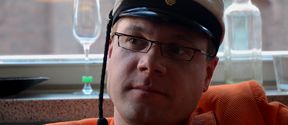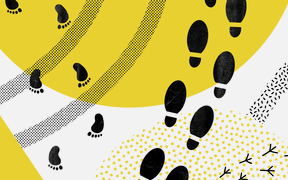Kristiina Mäkelä: My stride is generally brisk, motivated and positive
'Whenever possible, I say yes when someone in our community invites me to an event. I'm involved in so many things, and I move around the campus a lot.'

This is my first year as a doctoral researcher, so I can talk a little bit about my experience before I decided to embark on the Ph.D. journey in the unit of Entrepreneurship.
Before entering the PhD program, I held leadership positions in tech companies and founded two businesses, a marketing agency, and a fashion-tech circular economy startup. After working in the high-stress startup ecosystem and taking the leap into entrepreneurship myself, I knew that any new endeavor, especially that of a PhD, would require perseverance and grit to succeed, but most importantly, I knew I could not underestimate the role of a community. A great community helps you grow.
Also, I am quite social and outgoing, and I like to connect with people. So, it was important for me that there was a positive and good vibe in the Aalto community, in addition to the academic expertise. I wanted to get to know the people I would be working with, so I did my due diligence by reaching out to several people at the Aalto University Department of Management Studies, including my current supervisor Ewald Kibler, colleagues, and alumni of the program. I wanted to get a feel for the culture of the department.
To my delight, everything went smoothly in these meetings, and I felt connected. That's when I made my final decision to apply. The passion for research was palpable, and I knew I would thrive in this environment. Now that I am experiencing work in the unit myself, I can certainly confirm that I am surrounded by brilliant minds, and the discussions we have are inspiring and thought-provoking.
Our unit is very young and dynamic. There are 15 of us in total. Our culture is vibrant, supportive, and embracing. It’s oriented towards professional growth and development.
Our culture is based on a sense of community. We organize entrepreneurship seminars where we give feedback on each other’s research and share our progress. We also have team building events, where we might go bowling together or play football. I think the community is phenomenal. I’ve met some great colleagues and my supervisor is a wonderful person. I hope the community stays like this.
Anastasia KoptsyukhI feel that each person is a whole universe, and we can learn so much from each other. We all have different life stories and experiences.
I was born in Ukraine and grew up in Israel and Spain. I also lived in other countries like Canada, Germany, and Vietnam. Being exposed to such a multicultural environment and a globalized society since I was a kid helped me connect with others and be open-minded. I ended up learning to communicate in 8 languages... and have never ceased to explore the world around me.
I am passionate about understanding people, especially their orientation to become entrepreneurial. Now, I’m conducting ethnographic research in a humanitarian enterprise - a support center that has helped Ukrainian refugees and protection seekers since the Russian full-scale invasion of Ukraine. The humanitarian project started with a team of people supported by a local NGO, and through their networks, they got in touch with various European and international organizations. The project has helped thousands of forced migrants. My ethnographic research also led me to work a few months for the City of Helsinki and to be commissioned by the Ministry of Interior Finland to write a report on the situation of Ukrainians in Finland.
It is still very hard to live with the horrors of the war in my home country, but I feel a lot of support from the community at Aalto. My research is related to understanding crises and alleviating disasters from an entrepreneurial perspective, and therefore I feel I can do something impactful and meaningful.
Walking in my shoes at the moment requires awareness, initiative, hard-work and a proactive response to the war in Ukraine.
I feel that each person is a whole universe, and we can learn so much from each other. We all have different life stories and experiences. Connecting with others enriches our worldview and broadens our horizons.

I started practicing improv in 2015. I was living in Barcelona at the time and joined the local improv group. After that, I lived in Vietnam for two years and did the same. Wherever I go, impro is always part of my life.
Impro practice helps me recharge and be much more creative and present in the moment. Of course, there are sometimes moments when I’m stiff or tense, and too much in my head. But impro helps me ground myself. I can use impro skills in my everyday life.
A typical impro practice with a new group could start for instance with everyone introducing themselves with a name and a gesture. Then we can do active listening and movement exercises to activate our bodies. We can then start playing short-form games or long scenes.
An impro session is about awareness, acceptance, connection, collaboration, support, and mutual understanding. When you are present, you can actively listen to what is happening around you and react. All you have to do is show up and enjoy the play.
I knew very well how impro could benefit the community at Aalto and I really wanted to bring impro to our department.
In the research community there is a tendency towards perfectionism, which can sometimes block you from moving forward or make you feel like you are not good enough. But in impro it is the opposite: you are good enough, just the way you are. This self-acceptance and encouragement allow you to take risks and make space for creativity to flourish.
I talked about impro in the coffee room of our department. My colleague Elisa Utriainen, who is our HR partner, was also there and immediately connected with the idea. We started to organize impro sessions together. Luckily, the department had a budget and supported us, and we hired Pasi Virtakari as an instructor. Since November, we have been running impro practices on a monthly basis. After the budget ran out, I led some sessions myself. We are expecting to receive more funding from the department for the impro sessions in the coming months.
The sessions were very engaging, and we’ve received great feedback from the participants. Impro helps to open up, let go, release tension, relax, and have fun with colleagues. It can also help researchers with public speaking skills. It reduces anxiety and encourages people to feel positive about failures and mistakes, and to keep moving forward.
Even though we started practicing originally within our own department, soon enough people joined from other departments and projects. It was great to connect with professors, fellow doctoral researchers, and other colleagues, and have fun together.
Anastasia KoptsyukhImpro helps to open up, let go, release tension, relax, and have fun with colleagues.
I would like Aalto to invest more in projects that foster connection and creativity. For instance, we had a departmental getaway event some months ago in Haikko. We didn’t just discuss research; we also networked with each other, had a collage workshop, and enjoyed the spa. These kinds of activities bring us together.
When people make mistakes, they learn and reflect. If mistakes are frowned upon, the learning and reflection processes can be interrupted. When failure is encouraged, it’s no longer a failure, but a natural part of the individual’s growth process. Therefore, I’d encourage people to embrace mistakes and to treat them as opportunities to grow. Improvisation is a great tool to do exactly that.
Interview and text: Tiina Aulanko-Jokirinne

'Whenever possible, I say yes when someone in our community invites me to an event. I'm involved in so many things, and I move around the campus a lot.'

'If I look at my own career, the skills I learned in the Student Union’s Representative Council and as a chairman and artistic misleader at Retuperän WBK are the skills I need as a department head: how to get along with people, how to lead a group, and how to motivate people. A role model is important.'

'The EDI topics involve a social debate that can stir up strong emotions, including polarisation. When I started the assignment, I was nervous about whether I could talk about the right issues in the right way.'
Inspired by the saying that you should walk a mile in someone’s shoes to understand them, the ‘Walk in my shoes’ series aims to share some of the experiences, thoughts, perspectives and challenges faced by members of the Aalto community.



